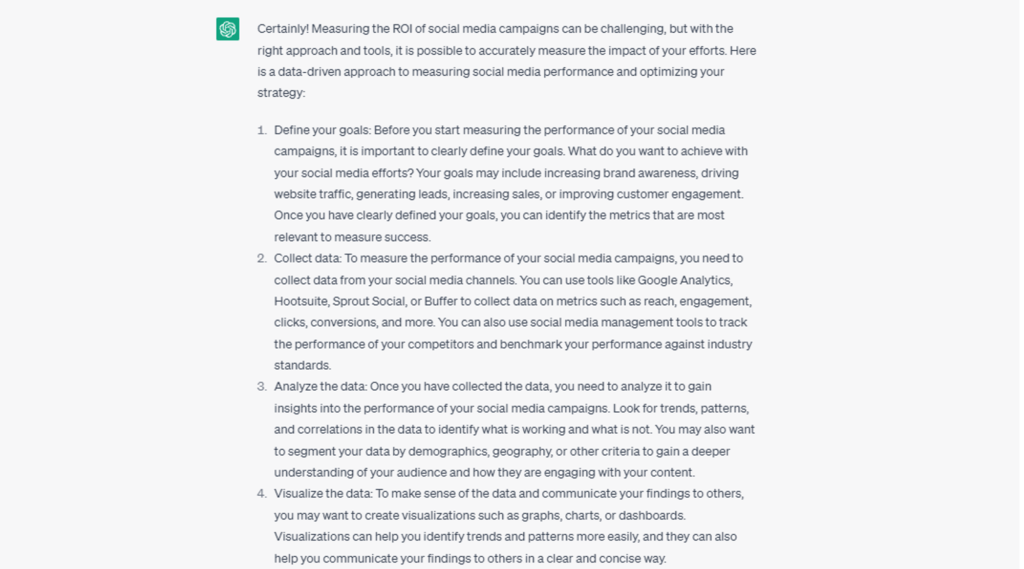
How To Develop Social Media Reports With ChatGPT

Welcome to our guide on developing social media reports with ChatGPT. In this article, we will walk you through the process of leveraging ChatGPT’s capabilities to create insightful and impactful social media reports. Whether you are a marketer, social media manager, or business owner, this guide will provide you with valuable tips and strategies to enhance your reporting efforts.
Understanding the Importance of Social Media Reports
Social Media reports serve as a comprehensive compass, guiding us through the dynamic landscape of social media platforms. These reports not only provide a retrospective analysis of engagement metrics. Audience demographics, and content performance but also furnish invaluable insights for future strategies. With the ability to gauge the effectiveness of campaigns, identify trends, and measure overall impact. Social media reports empower users to make informed decisions and optimize their online presence.
Getting Started with ChatGPT
ChatGPT is an advanced language model that can assist you in generating social media reports. To begin, you need to have access to ChatGPT and a dataset containing relevant social media data. You can either train ChatGPT on your own dataset or use a pre-trained model, depending on your requirements and resources.
1. Training ChatGPT on Your Own Dataset
If you choose to train ChatGPT on your own dataset. Ensure that the dataset is comprehensive and representative of your target audience. Include a wide range of social media posts, comments, and interactions to capture the diversity of your audience’s behavior. Additionally, make sure the dataset is properly labeled and organized for effective training.
2. Using Pre-trained ChatGPT Models
If training ChatGPT from scratch seems daunting, you can leverage pre-trained models that are readily available. These models are trained on vast amounts of data and can provide accurate and reliable responses. However, it’s important to fine-tune the pre-trained models with your specific social media dataset. To ensure the generated reports align with your brand’s tone and style.
Generating Social Media Reports with ChatGPT
Once you have trained or fine-tuned ChatGPT, you are ready to generate social media reports. Here are the steps to follow:
1. Define Your Reporting Objectives
Before diving into report generation, clearly define your reporting objectives. Determine the key metrics and insights you want to extract from the social media data. This will help ChatGPT generate reports that are aligned with your goals and provide meaningful information.
2. Input Relevant Social Media Data
Provide ChatGPT with the necessary social media data for report generation. This can include data from platforms like Facebook, Twitter, Instagram, and LinkedIn. Ensure that the data is clean, organized, and relevant to the objectives you defined earlier.
3. Ask Targeted Questions
To extract specific insights from ChatGPT, ask targeted questions related to your reporting objectives. For example, you can ask about audience demographics, engagement levels, sentiment analysis, or the performance of specific campaigns. The more specific and detailed your questions, the more valuable the generated reports will be.
4. Review and Refine the Generated Reports
Once ChatGPT generates the reports, review them carefully. While ChatGPT is a powerful tool, it’s essential to ensure the accuracy and relevance of the generated insights. Refine the reports as needed, and validate the information against other data sources or manual analysis to maintain data integrity.
Benefits Of Generating Social Media Reports with ChatGPT
Time- Saving and effectiveness
Developing social media reports manually can be a time- consuming and tedious process. Still, with ChatGPT, you can automate this task and save precious time. By using the power of natural language processing, ChatGPT can dissect large volumes of social media data. And induce comprehensive reports in a bit of the time it would take a mortal critic. This allows businesses to concentrate on other important tasks while still carrying accurate and detailed perceptivity from their social media performance.
Data Analysis and Visualization
ChatGPT excels at data analysis, making it an ideal tool for developing social media reports. It can reuse complex datasets, identify trends, and excerpt meaningful perceptivity. By exercising ChatGPT, businesses can gain a deeper understanding of their social media criteria , similar as engagement rates, reach. And followership demographics. likewise, ChatGPT can also induce visualizations similar as maps and graphs, making it easier for businesses to interpret and present their social media data.
Customization and Personalization
Every business has unique pretensions and conditions when it comes to social media reporting. ChatGPT offers a high degree of customization, allowing businesses to conform their reports according to their specific requirements. Whether it’s opting specific criteria , comparing different time ages, or assaying contender data. ChatGPT can be trained to induce reports that align with the specific objects of each business. This position of customization ensures that the perceptivity gained from the reports are applicable and practicable.
Delicacy and thickness
mortal crimes can do when manually developing social media reports, leading to inaccuracies and inconsistencies in the data. ChatGPT, on the other hand, is designed to give accurate and harmonious results. It eliminates the threat of mortal error and ensures that the generated reports are dependable and secure. Businesses can confidently calculate on the perceptivity handed by ChatGPT to make informed opinions and measure the effectiveness of their social media strategies.
Prompts For Developing Social Media Reports
Prompt 1
Can you provide me with data-driven recommendations on key metrics such as engagement, reach, and conversions for promoting [product/service] to [target audience] on social media channels? I am interested in understanding which channels are most effective for reaching our target audience, and how we can optimize our social media strategy to increase engagement and conversions. Any insights you can provide on the most effective types of content, posting frequency, and optimal posting times based on our audience and industry would be greatly appreciated.
Prompt 2
I would like to improve our social media content strategy to increase engagement and reach. Can you provide me with insights on the type of content that would be most effective, as well as the best posting frequency and optimal posting times based on our audience and industry? I am particularly interested in data-driven recommendations that will help us achieve our goals more efficiently and effectively.
Prompt 3
I am curious about the most successful social media campaigns in our industry and how we can replicate their success. Can you provide me with case studies and recommendations on key metrics such as CTR, conversion rate, and ROI? I would like to understand what makes these campaigns successful and how we can apply those insights to our own social media strategy.
Prompt 4
As we prepare for the upcoming year, I am interested in understanding the key social media trends that we should be aware of. Can you provide me with insights and predictions based on industry reports and expert opinions? I would like to stay ahead of the curve and ensure that our social media strategy is aligned with the latest trends and best practices.
Prompt 5
I would like to measure the ROI of our social media campaigns and determine which metrics we should focus on. Can you provide me with a data-driven approach to measuring social media performance, including tips on data collection, analysis, and visualization? I am particularly interested in understanding how we can use data to optimize our social media strategy and improve our overall performance.
Result

Read Also: Write Market Analysis Reports With ChatGPT.
Tips
Final Words
Developing social media reports with ChatGPT can significantly enhance your reporting capabilities and provide valuable insights to drive your social media strategies forward. By understanding the importance of social media reports, leveraging ChatGPT effectively, and following best practices, you can unlock the full potential of your social media data and make informed decisions for your brand’s success.
For more such information come to our array of prompts for work.








